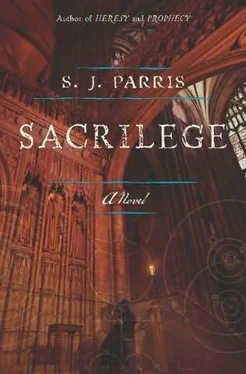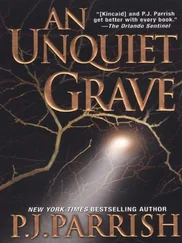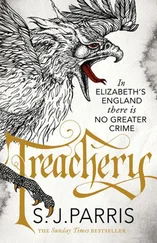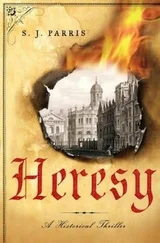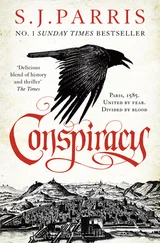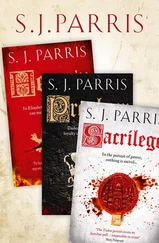“Business is good here?”
Fleury shrugged.
“Life is always precarious in a strange land. You know this, I think. But we can feed ourselves, for the moment, and for that I give thanks.”
At the top of the stairs was a long landing with another staircase, even narrower, rising to the next floor. He gestured for me to climb alone.
“In the attic,” he whispered, by way of explanation. “Keep your voices down.”
The ceiling was low, sloping to either side under the crooked roof and I had to bend to avoid the supporting beams as I pushed open the small door at the top of the stairs. Sophia was seated at a rough-hewn table, Olivier Fleury standing by the tiny window, leaning on the sill and looking out. Both started with alarm as I slipped through the door; Sophia jumped quickly to her feet.
“Bruno!” For a moment she gave the impression that she was about to run and embrace me, but instead she flashed me a shy smile and raised her arms before letting them fall to her sides. Olivier regarded me with that same expression of sullen disdain. “Any news? Have you found him?”
I looked at Sophia. She had washed and, though she was still dressed in boy’s clothes, they were now clean. Her hair hung softly, almost into her eyes, its shortness at the back emphasising her long, slender neck. I noticed the days of riding in the sun had brought out a scattering of freckles across the bridge of her nose.
“Give me a chance—I have not been here a day. But there is news—I have just come from the scene of another murder.”
“ What? ”
Her hand flew to her mouth; she stared at me, eyes wide. But my attention was distracted by a gasp from the corner of the room; it was only then that I realised there was a third person present, a young woman dressed in black, sitting on a straw mattress tucked away under the eaves. I raised my eyebrows at Sophia; she glanced briefly at the woman on the bed.
“Hélène, Olivier’s sister,” she said, as if this was not of much interest. “But who has been murdered?”
“Is it a child?” the woman Hélène whispered, her voice dry as autumn leaves. She had fine fair hair and the same full lips as her brother. I looked at her in surprise.
“No—it was the apothecary from the High Street, William Fitch.”
Hélène gave a sort of shudder and crumpled visibly, as if she had been struck. She buried her face in her handkerchief and though her shoulders shook violently she made no sound.
“I am sorry. Did you know him well?” I asked her gently.
“It’s not that.” Olivier glared at me, as if once again I had been the bringer of misfortune, and crossed the room to give his sister a cursory pat on the arm.
Sophia frowned. “Everyone knew Fitch—he was something of a busybody. I kept away from his shop—he asked too many questions.” She shook her head. “But he was amiable with it. I wonder who could have wanted to kill him?”
“The manner of it was similar to your husband’s murder—his skull was smashed. You don’t suppose they could be connected?”
She frowned.
“I can’t see how. Especially if my husband’s killer wanted to be sure I was blamed. Another murder in my absence would undo that.”
“Did Sir Edward know Fitch?”
“He knew everyone in Canterbury. But he didn’t associate with him, if that’s what you mean.”
“But he knew Ezekiel Sykes the physician well, and Sykes knew Fitch,” I mused, thinking again of Sykes’s peremptory visit to the apothecary the previous afternoon.
Sophia made an impatient sound.
“You are overcomplicating matters, Bruno. I have told you where you would do best to look for my husband’s killer. The poor apothecary was probably attacked by robbers, taking advantage of the fact that the city is without a justice of the peace at the moment.”
“So the constable wants to think.”
“Well, then.” She folded her arms. “You see the world as full of hidden connections, Bruno. Sometimes things are no more than they appear. Didn’t William of Ockham say so?” She gave me a mischievous smile, which I could not help returning.
“Something like that. May we talk in private?”
Sophia looked across at Olivier, who still kept a protective hand on his sister’s shoulder. Hélène had sunk into herself, her face obscured by the handkerchief and her clasped hands. He nodded curtly at me, and extended a hand to help his sister rise.
“I hope you will find this man soon, monsieur,” he said, through clenched teeth, as he passed me. “Then you can both leave us in peace.”
“I will do my best,” I said, with forced politeness. Hélène’s gaze flickered briefly upwards to my face, then quickly back to the floor; I reached out and touched her gently on the arm and she flinched as if I had hit her.
“Pardon me,” I said, in French, “but why did you ask if a child had been killed?”
Her red-rimmed eyes filled with tears; she shook her head tightly and bunched the handkerchief harder against her lips. Olivier glared at me again as he put a protective arm around her and led her to the door.
“I have said the wrong thing, somehow,” I observed when they had gone. “Why is she so distressed?”
Sophia sat down at the table again and rubbed the back of her neck. She looked suddenly weary.
“That poor girl. Widowed at eighteen—her husband was killed during the massacre in Paris. She was pregnant when they fled to England and her son, Denis, was born here. Six months ago, he disappeared.”
“How do you mean?”
“Just that—he went out on an errand for his grandparents and never returned. He was only eleven.” She bit her lip and I noticed how she knotted her fingers together, though she kept her expression controlled, her gaze concentrated on a point on the wall. I guessed she was thinking about her own lost son and the sorrow of a mother.
“So that was what Olivier meant when he said they had enough grief already.” I pulled up a stool opposite her. “They reported it, I suppose? There was a search for the boy?”
“They reported it to my husband as the local justice—that was how I first met Olivier. He refused to give up—he came to the house every day until finally Sir Edward had to threaten him with arrest for trespass. There was a search, but since the Huguenots are not regarded by many in the town as true citizens, you may imagine how little effort was made. They told the family he had probably just run off to be a ship’s boy.”
“But you don’t think so?”
She shrugged.
“I never met the boy. The family say he would not have done so. But Hélène has talked herself into believing the worst, because of the other child that was found.”
“What other child?”
“It was last autumn, before I arrived here, a few months before her son went missing. The body of a young boy, around the same age, was found dismembered on a midden outside the city walls. He was a beggar child, they said. But Hélène has seized on it to fuel her belief that her son has been killed too.”
“What do you think?”
She gave me a long look and sighed heavily.
“I think it’s terrible, naturally, but …” She reached out and laid a hand gently over mine. “Bruno, you don’t need to unravel every unsolved death in this town. Just the one you came for, remember? Have you spoken to Nicholas Kingsley yet?”
“I will be a guest at his house tonight.”
She squeezed my hand, her eyes bright. “I knew you would manage this, Bruno. You will find something there to clear me, I’m certain of it.”
I regarded her with a serious expression.
“You are very determined that it should be Nicholas. And he is equally determined that it was you.”
Читать дальше
Конец ознакомительного отрывка
Купить книгу
